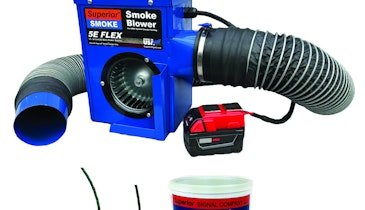
Contact Jim with your comments, questions and opinions at editor@pumper.com.
As I stare out my office windows at the persistent rainfall, my thoughts turn to the many pumpers who are frustrated by the weather this time of year. They face challenges like slippery mud everywhere they go to provide service, thawing ground that can pose costly and messy problems, and impatient customers facing flooded, failing systems.
It’s a time where demand is high for a septic service, but many pumpers have to sit on their hands, unable to scramble the crews to help out at a time of need. Of course, the situation tends to be more dire where I am in the Upper Midwest, but springtime weather creates unpredictability that would drive any contractor nuts.
Here a few of the weather woes you may encounter as you wait for the 2019 busy season to kick into gear and what you can do to try and cope with the situation:
Weight restrictions are imposed to protect your rural roads.
The northern regions of the U.S. and Canada experience extreme freeze-thaw conditions that make roads susceptible to damage from your heavy work trucks, especially in the month of April. States, counties and townships often post weight restrictions during the spring that can severely curtail your ability to serve customers. During parts of a two-month period between March and May, you may not have regular access to your biggest vacuum trucks.
So what can you do?
First, look for ways to legally run down the road. Perhaps your bigger trucks will run under the maximum allowable weight at half capacity and make more trips to the disposal plant. Or confine your work to your smaller service trucks and calibrate the capacity of any of your tanks to make sure you will not be over the limit if you are stopped for an inspection. Conduct an annual review with your local highway department officials to determine which roads can be used — those with a more significant roadbed — and which must be avoided completely.
Waterlogged drainfields are causing the phone to ring off the hook.
Isn’t it just the way things go that your call volume for emergency service would spike just when you are least able to provide quality service for your customers? You try to train homeowners to get in the habit of calling for routine maintenance and pumping the sludge from potentially problematic septic tanks every few years. You’d rather come out when drainfields are high and dry, the ground is as hard as cement and effluent isn’t backflowing into the settling or pump tanks. But people can’t seem to connect the wet spring season with nagging septic problems.
So what can you do?
First off, the spring season offers a handy reminder of the importance of consumer education about septic system operation. Remember these emergency calls throughout the year, and remind your regular customers to schedule inspections and pumping in the summer, fall and even winter if that’s possible. If you work in a climate that has significant freezing, encourage customers to add a riser to bring access to the surface and make it possible to service the tank in the slower winter season.
All of that is well and good for prevention, but what about customers who need help right now? Use those lighter trucks I talked about earlier and carry some extra suction hose. You may be able to run legally on the road, but you likely want to avoid private driveways and never pull onto the grass during a thaw cycle (or in almost any situation, really). Talk to your highway commissioners and local health department about your customer’s predicament. Ask if restrictions can be waived in the case of an emergency. Find out if smaller equipment — even a smaller aluminum vacuum tank on a trailer — can be used in dire circumstances. Communication with these officials is important. Just like you, they don’t want septic systems to fail and create a hazard for homeowners or potential groundwater contamination.
Every crevice of your new truck is filthy. Your guys return to the shop covered in mud.
I’ll bet you cringe anytime you see that major investment pull into the yard covered in mud and sloppy road grime. You bought that truck partly to show your company’s professionalism, but it’s a never-ending battle to maintain it as a symbol of your quality service. And even more, accumulated crud can promote corrosion, prematurely aging the truck you spent hard-earned money to buy.
So what can you do?
One idea is to take that new rig off the road during the sloppiest time of the year. Do you have older trucks that can do the lion’s share of the work this month? If you must run your new truck in the worst weather, do you have the resources to clean it regularly and thoroughly — even daily if it’s warranted by your workload? Give your workers the tools and time necessary to put your trucks away clean at night. It will pay off in your improved reputation and at trade-in time. If you don’t have a convenient wash bay at your disposal, can you hire a truck-wash service to ensure trucks stay in tiptop shape?
And what about your crews coming back wet and muddy at day’s end? Do you have a locker room and showers in the shop where they can clean up before going home? If not, is this something you could add for next year? And have you looked into hiring a laundry service so workers don’t have to take their dirty uniforms home to clean every night? This might be more popular as an employee benefit than you think.
IT’LL BE OVER SOON
It won’t be long before those May flowers replace the April showers. Until then, best of luck keeping all the crud inside the tank. Do you have other springtime concerns we can address in the future? Do you have other suggestions for getting through this messiest of all seasons for pumping professionals? Send your tips to me at editor@pumper.com or post your comments on the Pumper Facebook page.





